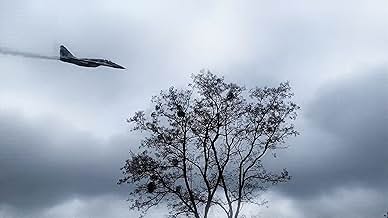VALUTAZIONE IMDb
8,5/10
26.369
LA TUA VALUTAZIONE
All'inizio dell'invasione russa, una squadra di giornalisti ucraini intrappolati nella città assediata di Mariupol lotta per continuare a documentare le atrocità della guerra.All'inizio dell'invasione russa, una squadra di giornalisti ucraini intrappolati nella città assediata di Mariupol lotta per continuare a documentare le atrocità della guerra.All'inizio dell'invasione russa, una squadra di giornalisti ucraini intrappolati nella città assediata di Mariupol lotta per continuare a documentare le atrocità della guerra.
- Regia
- Sceneggiatura
- Star
- Vincitore di 1 Oscar
- 34 vittorie e 51 candidature totali
Liudmyla Amelkina
- Self - Mariupol Resident
- (as Lyudmyla Amelkina)
Roman Golovanov
- Self - Correspondent
- (filmato d'archivio)
- …
Igor Konashenkov
- Self
- (filmato d'archivio)
Sergey Lavrov
- Self - Minister of Foreign Affairs of Russia
- (filmato d'archivio)
Ernest Matskyavichyus
- Self - Journalist
- (filmato d'archivio)
Vasiliy Nebenzya
- Self - Russian Ambassador to the UN
- (filmato d'archivio)
Volodymyr Nikulin
- Self - Police Officer
- (as Volodymyr)
Sergei Orlov
- Self - Deputy Mayor of Mariupol
- (filmato d'archivio)
Vladimir Putin
- Self - President of Russia
- (filmato d'archivio)
Linda Thomas-Greenfield
- Self - U.S. Ambassador to the UN
- (filmato d'archivio)
Volodymyr Zelenskyy
- Self - President of Ukraine
- (filmato d'archivio)
Recensioni in evidenza
I was very lucky to attend a sold-out screening of 20 Days in Mariupol in Boston that Mstyslav Chernov himself attended. This is a must-see, brutally honest and beautifully told documentary that portrays the naked evil and barbarity of russia's full-scale invasion of Ukraine from a deeply human standpoint. Chernov's voice as a storyteller is achingly Ukrainian, and the film's tone and editing evoke a sort of spiritual pain that exceeds the material destruction of war.
20 Days has a very strong edit that leaves in moments of Chernov's camera falling by his side as he's resting or unable to film: these moments add extra depth of realism and transport the audience into the warzone, not just watching some polished news report. There is almost a "found footage" quality to the edit and frantic first-person shaky cam scenes, but this film is much scarier and more disturbing than any horror movie could be because it's the truth, and to this very moment Mariupol is occupied by the same ruzzian butchers seen in this documentary.
The music and sound are another highlight-- the film ends on images of russian occupation set to a disturbing, pulse-like tone. The music throughout by Jordan Dykstra compliments the scenes greatly and elevates the film's tone, both in highly disturbing war scenes and in moments of bleak, depressing stillness.
20 Days in Mariupol is a cultural and historical document that should absolutely be shown in schools, especially in the West, so non-Ukrainian people can finally begin to understand the brutal, colonial and genocidal nature of russian imperialism. Mstyslav Chernov is nothing short of a hero in my eyes, and an incredibly brave and profoundly-spoken human being.
Watch this film and show it to as many people as you can.
20 Days has a very strong edit that leaves in moments of Chernov's camera falling by his side as he's resting or unable to film: these moments add extra depth of realism and transport the audience into the warzone, not just watching some polished news report. There is almost a "found footage" quality to the edit and frantic first-person shaky cam scenes, but this film is much scarier and more disturbing than any horror movie could be because it's the truth, and to this very moment Mariupol is occupied by the same ruzzian butchers seen in this documentary.
The music and sound are another highlight-- the film ends on images of russian occupation set to a disturbing, pulse-like tone. The music throughout by Jordan Dykstra compliments the scenes greatly and elevates the film's tone, both in highly disturbing war scenes and in moments of bleak, depressing stillness.
20 Days in Mariupol is a cultural and historical document that should absolutely be shown in schools, especially in the West, so non-Ukrainian people can finally begin to understand the brutal, colonial and genocidal nature of russian imperialism. Mstyslav Chernov is nothing short of a hero in my eyes, and an incredibly brave and profoundly-spoken human being.
Watch this film and show it to as many people as you can.
I don't usually include reviews on documentaries on this blog, but '20 Days in Mariupol' is a documentary that needs to be seen. This is current, relevant, and illustrates the horrors of war.
On February 24th, 2022 the city of Mariupol in Ukraine still looked normal. In the words of the narrator: "Wars don't start with explosions; it starts with silence." A Journalist team captures the outbreak of war, and documents how a city is reduced to ruins and rubble within just 20 days.
There are no actors here. There's no make-up, no CGI, no green/blue screen effects, no visual effects. We get to see the events unfold through the lens of a camera of men on the run fearing for their lives - raw footage. The documentary plays like a found footage sci-fi thriller, but this is real life with real people.
'20 Days in Mariupol' is harrowing to watch, and it is heartbreaking - more so because this is not fiction or fantasy. The film had me very emotional at times, so get that box of tissues before watching this. This ain't no popcorn flick; it is a hard-hitting documentary. Yes, it is depressing - as war generally is - but the world needs to see this. I'm so glad '20 Days in Mariupol' won the Oscar for Best Documentary. The film editing was also very good.
On February 24th, 2022 the city of Mariupol in Ukraine still looked normal. In the words of the narrator: "Wars don't start with explosions; it starts with silence." A Journalist team captures the outbreak of war, and documents how a city is reduced to ruins and rubble within just 20 days.
There are no actors here. There's no make-up, no CGI, no green/blue screen effects, no visual effects. We get to see the events unfold through the lens of a camera of men on the run fearing for their lives - raw footage. The documentary plays like a found footage sci-fi thriller, but this is real life with real people.
'20 Days in Mariupol' is harrowing to watch, and it is heartbreaking - more so because this is not fiction or fantasy. The film had me very emotional at times, so get that box of tissues before watching this. This ain't no popcorn flick; it is a hard-hitting documentary. Yes, it is depressing - as war generally is - but the world needs to see this. I'm so glad '20 Days in Mariupol' won the Oscar for Best Documentary. The film editing was also very good.
I saw this in a well-attended cinema screening just the other day. I can't recall a film having the impact this one did. At the end credits - silence. No one said a word and slowly filtered out. Its difficult not being effected by this film, as it confronts the viewer with the sort of hard-hitting stuff that the news generally air-brushes out. Its pretty much the exact opposite of comfort viewing - this film confirms not only are things bad but they are probably a lot worse than you imagined them to be.
As the title indicates, this is a ground level view of events in the Ukrainian city of Mariupol in the first 20 days of the Russian invasion. A disembodied voice-over relates details and an ominous soundtrack magnifies certain moments but mostly, the footage speaks for itself. The basic set-up has journalist Mstyslav Chernov stay behind to film events as the horror of war escalates on a daily basis. From Chernov's position, we are put directly into the war zone and are confronted with the civilian experience. To this end, we are forced to see the terror and suffering that these innocent people are forced to endure on account of a war initiated for utterly disingenuous reasons. While this is clearly a film about the Ukrainian situation and the sheer wrongness of the Russian invasion, it also will get you thinking that it is also about war in general, as these shocking moments are happening all over our world as part of various military conflicts. We can become desensitised to this and our news reporting is often far too sanitised, allowing us to more easily disconnect. Its films like this one which approaches war in the opposite way and ensures the viewer has no easy escape.
As the title indicates, this is a ground level view of events in the Ukrainian city of Mariupol in the first 20 days of the Russian invasion. A disembodied voice-over relates details and an ominous soundtrack magnifies certain moments but mostly, the footage speaks for itself. The basic set-up has journalist Mstyslav Chernov stay behind to film events as the horror of war escalates on a daily basis. From Chernov's position, we are put directly into the war zone and are confronted with the civilian experience. To this end, we are forced to see the terror and suffering that these innocent people are forced to endure on account of a war initiated for utterly disingenuous reasons. While this is clearly a film about the Ukrainian situation and the sheer wrongness of the Russian invasion, it also will get you thinking that it is also about war in general, as these shocking moments are happening all over our world as part of various military conflicts. We can become desensitised to this and our news reporting is often far too sanitised, allowing us to more easily disconnect. Its films like this one which approaches war in the opposite way and ensures the viewer has no easy escape.
My family moved out of Mariupol in mid-2021. We lived in between the Drama Theater and maternity hospital, across from the University. We sometimes sat outside at Coffee Racer cafe next to the hospital, drank coffee, and watched people strolling along Miru Ave.
My mother stayed behind in Mariupol. Despite the ominous warnings, nobody really expected a full-scale invasion with bombs and artillery. She lived directly across the street from hospital #2, which is where the filmmakers hid through much of the movie. In fact, her burning apartment building is the opening shot of "Day 16". The area all along Kuprina St, adjacent to the hospital and small church, sits at the very western edge of the city, which took the brunt of the attacks approaching from Crimea direction.
After surviving the initial bombings and attacks, Mom had to drink, cook, and clean herself with water from a well adjacent to shallow graves of her neighbors. Survivors chopped up furniture to burn for cooking. It was truly medieval in every way possible, and intentionally so. After 73 days trapped, she made it out by a miracle of good luck, but not before first going through Bezimmene filtration camp.
None of my family will watch this movie except me. Everything is too close and too familiar. One thing the movie does not show is how vibrant and thriving this same city had been prior to 2/24/22. It seems surreal to see your old comfortable neighborhood get intentionally destroyed on international news. To be honest, the Russians were so jealous of Mariupol that they tried to murder it. They cannot get away with this.
This is a story that absolutely needs to be seen and heard - without any sugar-coating - as painful as it may be.
My mother stayed behind in Mariupol. Despite the ominous warnings, nobody really expected a full-scale invasion with bombs and artillery. She lived directly across the street from hospital #2, which is where the filmmakers hid through much of the movie. In fact, her burning apartment building is the opening shot of "Day 16". The area all along Kuprina St, adjacent to the hospital and small church, sits at the very western edge of the city, which took the brunt of the attacks approaching from Crimea direction.
After surviving the initial bombings and attacks, Mom had to drink, cook, and clean herself with water from a well adjacent to shallow graves of her neighbors. Survivors chopped up furniture to burn for cooking. It was truly medieval in every way possible, and intentionally so. After 73 days trapped, she made it out by a miracle of good luck, but not before first going through Bezimmene filtration camp.
None of my family will watch this movie except me. Everything is too close and too familiar. One thing the movie does not show is how vibrant and thriving this same city had been prior to 2/24/22. It seems surreal to see your old comfortable neighborhood get intentionally destroyed on international news. To be honest, the Russians were so jealous of Mariupol that they tried to murder it. They cannot get away with this.
This is a story that absolutely needs to be seen and heard - without any sugar-coating - as painful as it may be.
Considering the searing nature of this troubling documentary, I feel somewhat uneasy in recommending it as must-see viewing. Nevertheless, this is one of those films that has to be seen in order for the truth behind its story to be fully realized. When Ukrainian journalist-writer-director Mstyslav Chernov and two colleagues chronicled the first days of the nation's brutal conflict with Russia, they probably had no idea what they were in for. Working from the Black Sea port city of Mariupol, they captured devastating footage of the relentless Russian attacks, particularly the enemy's ruthless assaults on civilian targets, despite assurances to the contrary. The Russians were simultaneously determined to destroy the Ukrainian communications infrastructure to prevent word of the atrocities from getting out to the wider world, seriously hindering the work of Chernov and company as the only international journalists still in the war-torn country at the time. As the city was systematically being destroyed, the international community had little knowledge of what was transpiring in Mariupol beyond Russian President Vladimir Putin's skewed propaganda claims. But, when images of the warfront finally made their way out of Ukraine, the world got an entirely new perspective on the carnage unfolding there, despite the Russians' astoundingly incredulous claims that everything that had been photographed was staged, not unlike what one would find on a movie set. Such reporting opened the eyes of the world, first in media coverage at the time and now in this film, a joint production of the Associated Press and the PBS documentary series Frontline. This gripping release holds nothing back, making it an exceedingly difficult watch for virtually everyone, including those with thick skins who ordinarily might not be affected by such graphic imagery. However, it honestly reveals what the Ukrainians were up against in this horrific siege, putting the war crimes of the aggressors on display for all to see. In addition, this offering reinforces the importance of the work of intrepid journalists under the most trying of conditions, particularly where those wreaking havoc are desperate to keep the facts from reaching the light of day. This highly acclaimed film - a recipient of ample awards season buzz and honors - may be difficult to sit through, but discovering the truth is often a challenging process, and both Ukraine and the world should be grateful that there are those out there who are willing to put themselves on the line to see that through, no matter how treacherous or daunting circumstances may be.
Lo sapevi?
- QuizA photograph by Evgeniy Maloletka of the injured pregnant woman being carried from the maternity hospital, was awarded "World Press Photo of the Year" in 2023. Her name was Irina Kalinina (32 years old). Her baby, named Miron (after the word for 'peace') was stillborn, and then his mother died in half an hour.
- Citazioni
Self - Narrator and interviewer: When we were in the hospital, one of the doctors told me, "War is like an X-Ray. All human insides become visible. Good people become better, bad people worse".
- ConnessioniFeatured in 2024 EE BAFTA Film Awards (2024)
I più visti
Accedi per valutare e creare un elenco di titoli salvati per ottenere consigli personalizzati
- How long is 20 Days in Mariupol?Powered by Alexa
Dettagli
- Data di uscita
- Paesi di origine
- Siti ufficiali
- Lingue
- Celebre anche come
- 20 днів у Маріуполі
- Luoghi delle riprese
- Aziende produttrici
- Vedi altri crediti dell’azienda su IMDbPro
Botteghino
- Lordo in tutto il mondo
- 35.971 USD
- Tempo di esecuzione
- 1h 37min(97 min)
- Colore
- Mix di suoni
Contribuisci a questa pagina
Suggerisci una modifica o aggiungi i contenuti mancanti
























